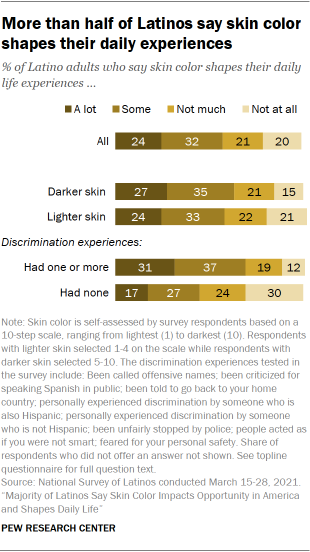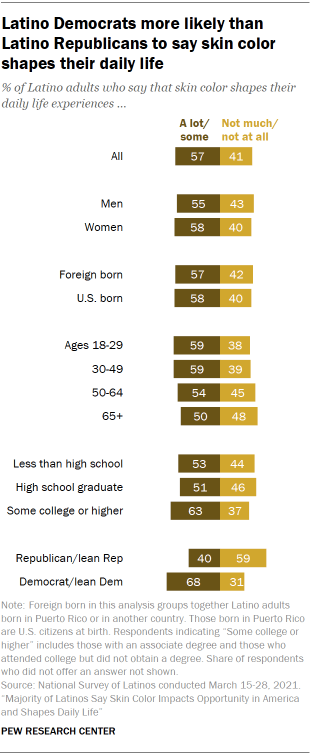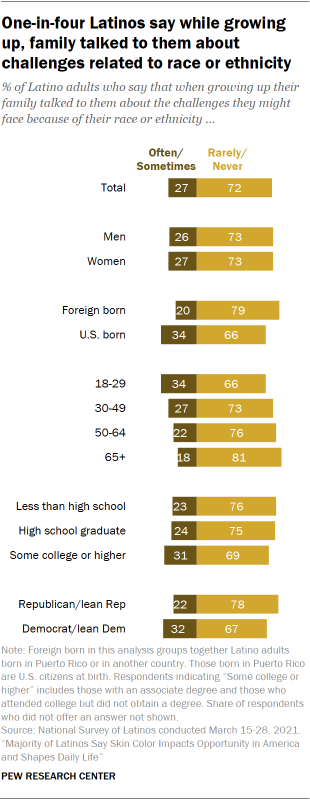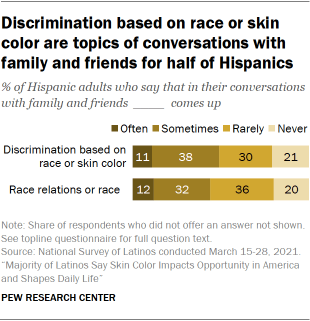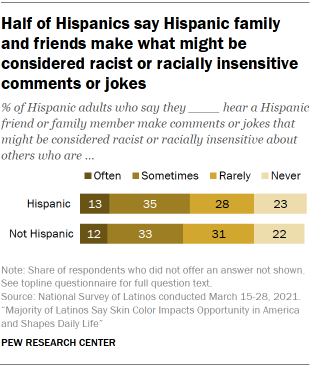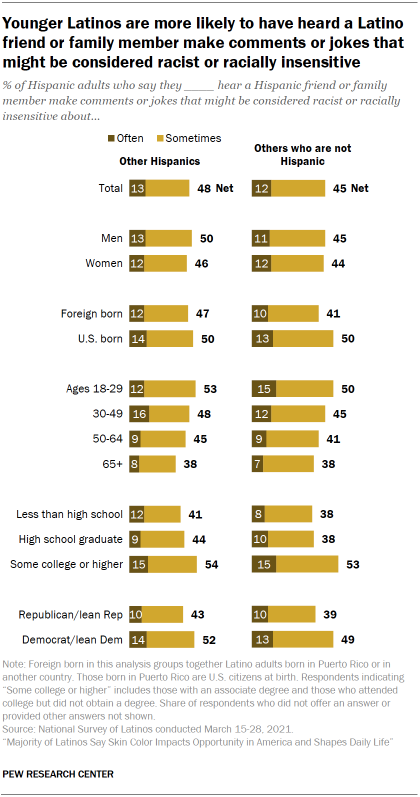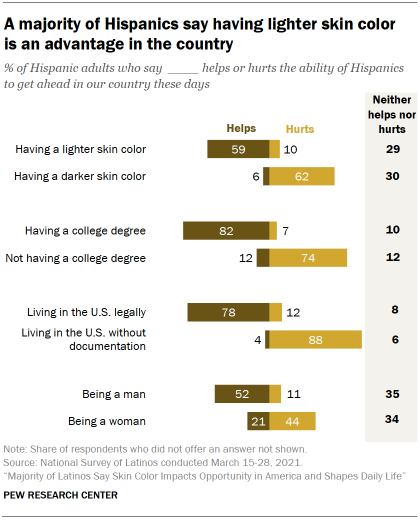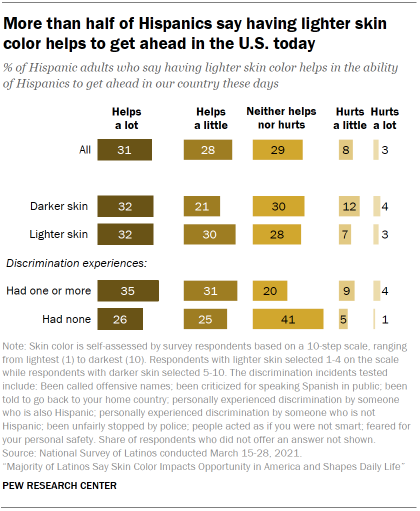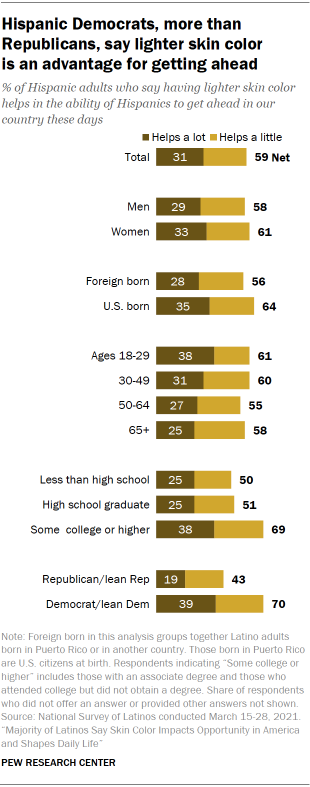The social and personal impact of race and skin color is on the minds of many U.S. Hispanics today. Most view skin color as an important influence in their daily lives and say having a lighter skin color is an advantage for getting ahead today. And while about a quarter say that during their upbringing they had at least occasional conversations with family about potential challenges they might face due to race, about half say discrimination due to race and skin color is sometimes a topic of conversations with family and friends today. Still, there are differences in views about the impact of skin color among Latinos, depending on how they describe their own skin color or if they have had a discrimination experience due to race or skin color in the past year.
Skin color shapes the life experiences of many Latinos
Over half of Latino adults (57%) say skin color affects their daily life experiences a lot (24%) or some (32%), while about one-in-five (21%) say skin color does not have much effect in their daily life or no influence at all (21% and 20% respectively).
More than half of Latinos say skin color affects their daily experiences regardless of their self-identified skin color, according to the survey. About one-in-four with darker skin (27%) and a similar share of those with lighter skin (24%) say skin color shapes their daily life “a lot,” while about a third of each group says it has some effect (35% and 33%).
Among Hispanics who reported experiencing at least one of eight specific forms of discrimination in the year before the survey, about two-thirds (68%) say skin color shapes their daily life at least some, while 43% of Hispanics who reported experiencing none of the discrimination experiences included in the survey say the same.3
While similar shares of Hispanic adults say skin color affects their daily experiences across many demographic subgroups, there are differences in the shares who say this by education and political party affiliation.
About six-in-ten Hispanics with at least some college experience (63%) say that skin color shapes their daily experience, a higher share than among those who are high school graduates (51%) or do not have a high school diploma (53%).
When it comes to party affiliation, roughly seven-in-ten Latinos (68%) who identify as Democrats or lean toward the Democratic Party say skin color affects their daily experiences, compared with four-in-ten (40%) who identify as or lean Republican, the largest difference among the main subgroups of the Latino population. Only among Latino Republicans do a majority (59%) say skin color shapes their daily life experiences not much or not at all.
When growing up, Hispanics with darker skin talked with family about likely challenges due to race or ethnicity more than those with lighter skin
When asked about conversations with family during their upbringing, about one-in-four Latinos (27%) say their family talked to them often (8%) or sometimes (19%) about the potential challenges they might face due to their race or ethnicity. Meanwhile, 25% say they rarely had these conversations when growing up and 48% say they never did. Still, there are differences by skin color in how often Latinos say they had these conversations when growing up.
About four-in-ten Hispanics with darker skin (41%) say that when growing up their family talked to them often (11%) or sometimes (30%) about potential challenges because of their race or ethnicity. By contrast, one-in-four Hispanics with lighter skin color (25%) say they had these conversations often (8%) or sometimes (17%) when growing up.
The survey also finds Latinos who have experienced discrimination in the year prior to the survey were more likely than those who had no discrimination experiences to say that during their upbringing, their family talked to them at least sometimes about potential challenges due to their race or skin color (37% vs. 14%).
The share of Latinos who say they had these conversations when growing up varies among some demographic subgroups.
Latinos born in the U.S. are more likely to say they had these conversations when they were growing up than those born in another country (34% compared with 20%).
Hispanics with at least some college experience (31%) were more likely than high school graduates (24%) or those who have not completed high school (23%) to say their families talked to them often or sometimes about potential challenges related to race or ethnicity. Meanwhile, Hispanics who identify as Democrats (31%) were more likely than Hispanic Republicans (22%) to say they had these conversations often or sometimes during their upbringing.
When it comes to racial identity, Latinos who say their race is White, whether self-described or not, are less likely to say that when growing up their family talked to them about challenges they would face because of their race or ethnicity. For example, Latinos who say they would be described as White by most people who walked by them on the street were less likely (18%) than those who think they would be described as Hispanic or Latino (28%), or mixed race or another race (37%), to say their family talked to them about potential challenges due to their race or ethnicity. Similarly, in an open-end question that asked about race or origin, those who identified as White (15%) were less likely than those who identified as Hispanic or Latino (23%) or with another race (27%) to say they had conversations with family about potential challenges due to their race or ethnicity in the future.
Half of Latinos today talk about discrimination based on race or skin color with their family and friends
About half of Hispanics (48%) say that in current conversations with family and friends, discrimination based on race or skin color comes up often (11%) or sometimes (38%). Meanwhile, 30% say it rarely comes up and 21% say it never does.
Similar shares say race and race relations are topics of conversation. Some 44% of Latinos say it comes up often (12%) or sometimes (32%) in their conversations with friends and family.
Roughly half of Latinos report hearing racially insensitive comments or jokes from Latino family and friends
About half of Hispanics say they at least sometimes hear a Hispanic friend or family member make comments or jokes that might be considered racist or racially insensitive. Sometimes these comments or jokes are about other Hispanics: Roughly half (48%) say they have heard racist or racially insensitive comments or jokes often (13%) or sometimes (35%) from Hispanic friends and family when talking about other Hispanics. Sometimes these comments or jokes are about others who are not Hispanic: 45% of Hispanic adults say they often (12%) or sometimes (33%) hear these comments or jokes from Hispanic friends and family in reference to people who are not Hispanic.
Regardless of whether jokes or comments reference Hispanics or non-Hispanics, younger adults are more likely than those who are older to say they often or sometimes hear Hispanic friends or family members make comments or jokes that might be considered racist or racially insensitive. About half of Hispanics ages 18 to 29 say they hear racist or racially insensitive comments or jokes about other Hispanics (53%) or others who are not Hispanic (50%) from their Hispanic friends and family. By contrast, 38% of Hispanics ages 65 and older say they hear the same type of comments or jokes from Hispanic friends or family in reference to other Hispanics or people who are not Hispanic. Hispanics with at least some college experience are more likely than those with no college experience to say they hear racist or racially insensitive comments from Hispanic friends or family, and those who identify as Democrats are more likely than Republicans to say the same.
Having a lighter skin color seen as an advantage for getting ahead
Hispanics view skin color as a driver of advantage when it comes to getting ahead in the U.S.
About six-in-ten Latinos (59%) say that having a lighter skin color helps at least a little in the ability of Latinos to get ahead in the country these days, while 29% say it neither helps nor hurts and 10% say it hurts. By contrast, roughly six-in-ten Latinos (62%) say having a darker skin color hurts the ability to get ahead, more than the 30% who say it neither helps nor hurts or the 6% who say it helps.
In a related 2019 survey, 61% of Latinos said that being White helps at least a little in a person’s ability to get ahead in the country, a similar share to the 59% of the U.S. general population who said the same.
Even so, while many Latinos say skin color can help or hurt one’s chances of getting ahead in the country today, other factors such as education and legal status are seen as bigger factors for success. For example, 82% of Latino adults say having a college degree helps when it comes to Latinos getting ahead in the U.S. today. And 88% say living in the U.S. without documentation hurts Latinos’ chances of getting ahead.
About six-in-ten Latinos who self-identified as having lighter skin color (62%) also say that having lighter skin color helps at least a little in their ability to get ahead in the country, while a lower share (53%) of Latinos who say they have darker skin color say the same. And two-thirds (66%) of those who reported at least one discrimination experience say having lighter skin helps to get ahead, compared with 51% among those who reported none.
Across many major demographic groups, half or more say that having a lighter skin color helps in their ability to get ahead – with the exception of Republicans.
Latino Democrats (70%) are considerably more likely than Republicans (43%) to say having lighter skin color is an advantage.
Meanwhile, Hispanics with at least some college experience (69%) are more likely than those with no college experience to say that lighter skin color helps at least a little in the ability to get ahead in the country (51% among high school graduates and 50% among those who have not graduated high school).
Other measures of racial identity show a connection to views about skin color and advancement in the U.S. For example, about seven-in-ten Latinos who say they would be described as White (68%) by most people who walked by them on the street say that having a lighter skin color helps in the ability to get ahead, a higher share than among those who think they would be described as Hispanic or Latino by a passerby (58%).
In addition, a slightly higher share of U.S.-born Latinos (64%) than those who are foreign born (56%) say having a lighter skin color is an advantage for Latinos when it comes to getting ahead in the U.S. today.


